
In early 1978 Henry Fonda stood before a star-studded crowd, and a national TV audience, accepting the American Film Institute’s Life Achievement Award.
Clear-eyed and emotionally contained, the Oscar, Tony and Grammy winner told how a five-decade-plus acting career got its unlikely start.
“Do [Dorothy] Brando had more or less nudged me onto the stage of the Omaha Community Playhouse, and I discovered this magic of the theatre that I hadn’t known anything about.”
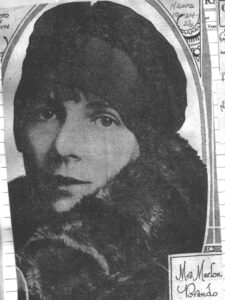
It was early Fall 1925, and the Playhouse’s first season was barely launched. Its second show, “You and I” by J.M. Barrie, called for a male juvenile. Director Gregory Foley didn’t find him at auditions.
Fonda, then a painfully shy 20-year-old, had a job as a file clerk for a retail credit company. He lived with his parents, W.B. and Herberta, near 52nd and California Streets. Brando asked her friend, Herberta, to coax Henry to a private read for the director.
He got the part. He later said he couldn’t have been very good, but once the lights went up, “I was hooked.” That first season he took bit parts in three more shows, built and painted scenery, hung lights and pulled the curtain up.
“I discovered it was therapy for a very self-conscious young man,” he told the AFI crowd. “I could put on a mask, hide behind it … For the eight months of that first season I was totally involved…”
The second season brought real-life drama. Foley wanted Fonda for the lead in “Merton of the Movies,” a play about a grocery clerk who dreams of being a Hollywood star.
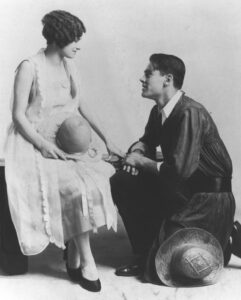
“My dad was appalled,” Henry recalled. W.B. insisted his son needed to “forget this foolishness” and concentrate on a business career.
“We had quite a fierce argument, until my mother stepped in as a mediator. And I kept the job, and I rehearsed ‘Merton’ evenings and weekends.”
His father gave him the silent treatment. For over a month.
But the family came to the opening. When Henry got home, his father sat behind a newspaper while his mother and sisters, Jayne and Harriet, gushed. Then Harriet began a suggestion.
“And Dad’s paper came down, and he said, ‘Shut up. He was perfect.’ I guess that’s just about the best notice I ever got.”
The AFI crowd roared its approval.
For season three, Foley hired Fonda as his assistant at $100 a month, and Henry starred with Do Brando in “Beyond the Horizon.” Henry and his sisters had all appeared in a show together by then.
By season four in 1928, Henry had left Omaha, hired to do summer stock in Cape Cod. His father’s resistance to an acting career had melted. Soon Fonda was rooming with another starving actor, Jimmy Stewart, in New York City. Friends ever after, both became major stage and film stars in the 1930s.
The American Film Institute later ranked Fonda among its Top Ten actors from the first 100 years of movies. The Motion Picture Academy and the Tonys each gave him life achievement awards.
Portraying the quiet hero became his hallmark. His genius was in conveying integrity with a straightforward, unflashy acting style in classic films like “Jezebel,” “Young Mr. Lincoln,” “The Grapes of Wrath” (Oscar nomination), “The Oxbow Incident,” “My Darling Clementine,” “Mister Roberts,” “The Wrong Man” and “12 Angry Men” (Oscar nomination as producer).
On Broadway, Fonda had long runs in “Mister Roberts” (best-actor Tony), “The Caine Mutiny Court Martial,” “Two for the Seesaw” and “Clarence Darrow” (Tony nomination).
In a 1997 “A&E Biography” profile, actor Anthony Quinn said of Fonda: “He learned acting from his soul. His authority came from inside, never from gestures.”
Interviewed in 1980 by “Tonight Show” host Johnny Carson, Fonda said his goal was always to “make the audience forget they’re watching a performance.”
He was never more successful at it than in “On Golden Pond,” for which he finally won the best-actor Oscar opposite Katharine Hepburn and his daughter, Jane, in 1982. He died a few months later of a heart ailment, at age 77.
Jane Fonda, a seven-time Oscar nominee and double Oscar winner (“Klute,” “Coming Home”), got her start at age 17, appearing with Henry and actress Dorothy McGuire in a 1955 benefit production of “The Country Girl.” Five performances at Omaha’s Music Hall raised $27,000 toward construction of the present Playhouse.
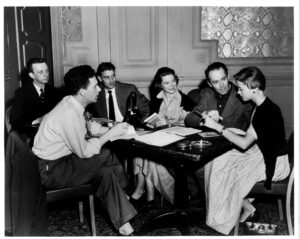
Henry’s son, Peter, who went to college in Omaha, appeared in two Playhouse productions in 1961, “The Golden Fleecing” and “The Pleasure of His Company.” He later earned Oscar nominations for “Easy Rider” and “Ulee’s Gold.” He died in 2019 at age 79.
The last Fonda to act on OCP’s stage, distant cousin Matt, won a supporting-actor award for the Playhouse’s 1991 production of “Cabaret.”
Jane toured the Playhouse in 2012 after appearing at a Film Streams fundraiser. She marveled at the facility, saying the costume shop reminded her of the old movie studios.
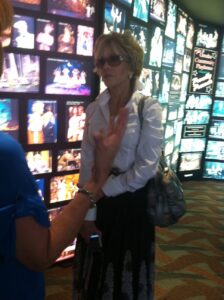
“I’m just so glad I got to do this,” she said. “Dad would be so proud.”
Fonda’s widow, Shirlee, has continued generous support for the Playhouse’s education programs — the Shirlee & Henry Fonda Theatre Academy. In making one such donation, Shirlee recalled her husband’s words:
“He said if it hadn’t been for the Playhouse, where he did his first bit of acting, he never would have become an actor.”
By the way, Dorothy Brando, who nudged Henry onto the Playhouse stage back in 1925 and appeared with him in several OCP shows, had a 1-year-old son at the time. Marlon Brando Jr. later won
Oscars for “On the Waterfront” and “The Godfather.” His family left Omaha in 1930, and he never appeared on the OCP stage as his parents had.
Henry Fonda and Dorothy McGuire never forgot where they got their start, and the Playhouse never forgot them either. Its top acting award each season is the Fonda-McGuire.
Dorothy McGuire began her long acting career as Henry Fonda’s 13-year-old co-star in the 1930 OCP comedy “A Kiss for Cinderella.”
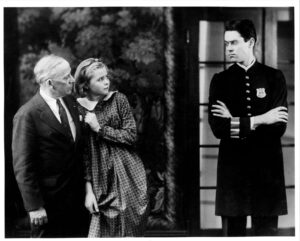
McGuire was the understudy for the original Broadway production of “Our Town” in 1938, later taking over the lead when Martha Scott left the show.
McGuire’s standout movie performances include “The Enchanted Cottage,” “A Tree Grows in Brooklyn,” “Gentleman’s Agreement” (Oscar nomination), “Friendly Persuasion,” “Old Yeller” and “The Dark at the Top of the Stairs.” She died in 2001 at age 85.
In 1935 Fonda sent $500 toward buying new seats for the Playhouse, which was then at 40th and Davenport Streets west of Joslyn Castle. In 1940 he and McGuire sponsored Playhouse awards for best new actors. In 1951 he toured in “Mister Roberts,” appearing at Omaha’s Orpheum. He choked up onstage when OCP presented him a silver salver as its all-time best actor. Henry sent a donation to the Playhouse’s building fund in 1956 and attended the groundbreaking in 1957. He came again to tour the new building at 72nd and Cass Streets just before it opened in 1959.
In 1975, McGuire paid for studio theatre doors and repairs for a main entrance damaged by a blizzard. In 1981 Henry appeared at a fund-raiser for OCP, “An Evening With Mr. Fonda,” during which he talked about his career. Dorothy McGuire attended, as did Peter and Jane Fonda.
In 1982 Jane appeared at an Orpheum Theatre premiere screening of “On Golden Pond,” then attended a Playhouse buffet, which netted $85,000 toward a 1986 OCP expansion. A few weeks later at the Academy Awards, she accepted the Oscar for her ailing dad.
When Henry died later that year, hundreds of memorial gifts — including $5,000 from McGuire — raised another $32,000 for the Playhouse expansion.
Lasting Legacies with Bob Fischbach
As part of our centennial celebration, OCP will share monthly feature-length articles by OCP board of trustees’ member Bob Fischbach that salute key individuals and patrons who made a lasting difference in the legacy of the Playhouse’s first 100 years.
Notifications